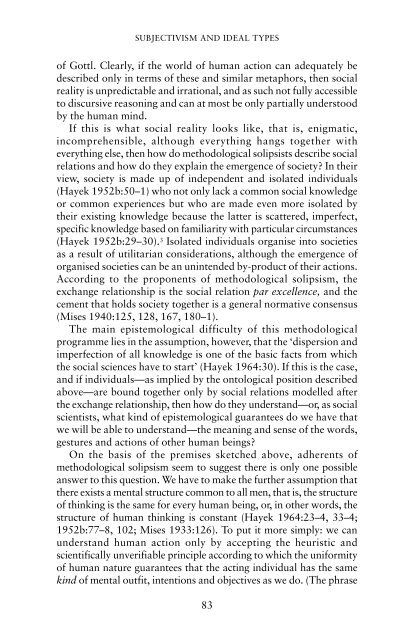Subjectivism and Economic Analysis: Essays in memory of Ludwig ...
Subjectivism and Economic Analysis: Essays in memory of Ludwig ...
Subjectivism and Economic Analysis: Essays in memory of Ludwig ...
You also want an ePaper? Increase the reach of your titles
YUMPU automatically turns print PDFs into web optimized ePapers that Google loves.
SUBJECTIVISM AND IDEAL TYPES<strong>of</strong> Gottl. Clearly, if the world <strong>of</strong> human action can adequately bedescribed only <strong>in</strong> terms <strong>of</strong> these <strong>and</strong> similar metaphors, then socialreality is unpredictable <strong>and</strong> irrational, <strong>and</strong> as such not fully accessibleto discursive reason<strong>in</strong>g <strong>and</strong> can at most be only partially understoodby the human m<strong>in</strong>d.If this is what social reality looks like, that is, enigmatic,<strong>in</strong>comprehensible, although everyth<strong>in</strong>g hangs together witheveryth<strong>in</strong>g else, then how do methodological solipsists describe socialrelations <strong>and</strong> how do they expla<strong>in</strong> the emergence <strong>of</strong> society? In theirview, society is made up <strong>of</strong> <strong>in</strong>dependent <strong>and</strong> isolated <strong>in</strong>dividuals(Hayek 1952b:50–1) who not only lack a common social knowledgeor common experiences but who are made even more isolated bytheir exist<strong>in</strong>g knowledge because the latter is scattered, imperfect,specific knowledge based on familiarity with particular circumstances(Hayek 1952b:29–30). 3 Isolated <strong>in</strong>dividuals organise <strong>in</strong>to societiesas a result <strong>of</strong> utilitarian considerations, although the emergence <strong>of</strong>organised societies can be an un<strong>in</strong>tended by-product <strong>of</strong> their actions.Accord<strong>in</strong>g to the proponents <strong>of</strong> methodological solipsism, theexchange relationship is the social relation par excellence, <strong>and</strong> thecement that holds society together is a general normative consensus(Mises 1940:125, 128, 167, 180–1).The ma<strong>in</strong> epistemological difficulty <strong>of</strong> this methodologicalprogramme lies <strong>in</strong> the assumption, however, that the ‘dispersion <strong>and</strong>imperfection <strong>of</strong> all knowledge is one <strong>of</strong> the basic facts from whichthe social sciences have to start’ (Hayek 1964:30). If this is the case,<strong>and</strong> if <strong>in</strong>dividuals—as implied by the ontological position describedabove—are bound together only by social relations modelled afterthe exchange relationship, then how do they underst<strong>and</strong>—or, as socialscientists, what k<strong>in</strong>d <strong>of</strong> epistemological guarantees do we have thatwe will be able to underst<strong>and</strong>—the mean<strong>in</strong>g <strong>and</strong> sense <strong>of</strong> the words,gestures <strong>and</strong> actions <strong>of</strong> other human be<strong>in</strong>gs?On the basis <strong>of</strong> the premises sketched above, adherents <strong>of</strong>methodological solipsism seem to suggest there is only one possibleanswer to this question. We have to make the further assumption thatthere exists a mental structure common to all men, that is, the structure<strong>of</strong> th<strong>in</strong>k<strong>in</strong>g is the same for every human be<strong>in</strong>g, or, <strong>in</strong> other words, thestructure <strong>of</strong> human th<strong>in</strong>k<strong>in</strong>g is constant (Hayek 1964:23–4, 33–4;1952b:77–8, 102; Mises 1933:126). To put it more simply: we canunderst<strong>and</strong> human action only by accept<strong>in</strong>g the heuristic <strong>and</strong>scientifically unverifiable pr<strong>in</strong>ciple accord<strong>in</strong>g to which the uniformity<strong>of</strong> human nature guarantees that the act<strong>in</strong>g <strong>in</strong>dividual has the samek<strong>in</strong>d <strong>of</strong> mental outfit, <strong>in</strong>tentions <strong>and</strong> objectives as we do. (The phrase83

















